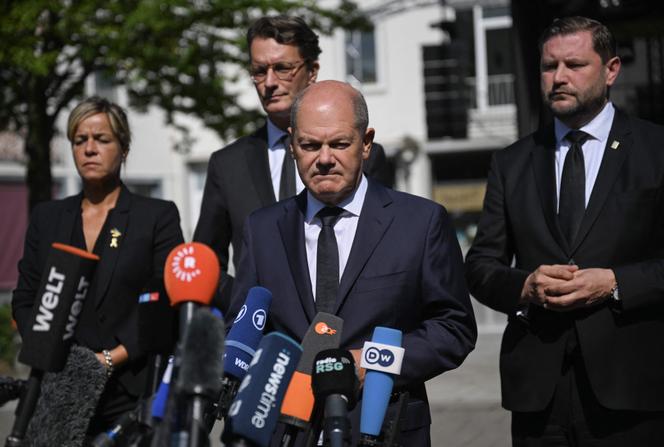


Three days after a knife attack which claimed the lives of three people at a festival in Solingen, western Germany on the night of Friday, August 23, Chancellor Olaf Scholz pledged to tighten immigration and arms regulations. With less than a week to go before elections in eastern Germany, which are expected to be marked by a sharp rise in far-right votes, he and local politicians visited the town between Düsseldorf and Cologne on Monday where the tragedy took place.
"This is terrorism, terrorism against all of us," said Scholz to reporters, referring to the attack on the Western way of life. "I'm angry," he said, keeping his usual poker face. At a festival celebrating the 650th anniversary of the town of Solingen on Friday evening, three people were killed and eight injured. The suspect, identified as Issa Al-H., is a Syrian refugee who arrived in Germany at the end of 2022 and was the subject of a deportation order. Suspected of links with the Islamic State organization, he surrendered to police on Saturday and was arrested.
"We will have to do everything we can to ensure that those who cannot, and must not, stay in Germany are deported," said the chancellor, claiming that deportations have increased by 30% in 2024 and by two-thirds since 2021. "We will be very attentive to how we can make these figures grow further," he said, explaining that controls on Germany's eastern border had, at the same time, reduced the number of illegal migrants. According to federal police data quoted by Agence France-Presse, the country deported 21,206 people in 2023, compared with a planned figure of 53,000.
The attack brings security issues back to the forefront, just a few days before regional elections that seem likely to be very unfavorable for the ruling coalition parties – in Thuringia and Saxony on September 1, then in Brandenburg on September 22. Above all, it comes less than three months after the death of a policeman stabbed to death by an Afghan refugee in Mannheim (southwest) at the end of May, which caused a stir just before the European elections. Scholz already promised deportation measures against "criminals," including those from Syria and Afghanistan.
However, Germany does not currently carry out deportations to these countries, in light of the fat that the security conditions there do not allow them. Before the summer, the government indicated that it had launched discussions with the goal of making such deportations possible. Friday's attack added fuel to the fire of criticism from the opposition, who accuse the government of inaction at a time when immigration is a central issue in the September regional elections.
You have 40.79% of this article left to read. The rest is for subscribers only.
